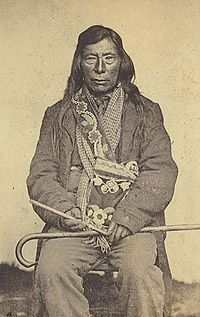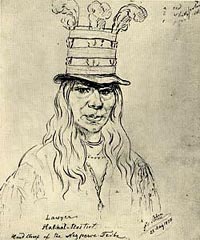Hallalhotsoot, also Hal-hal-tlos-tsot or "Lawyer"[1] (c. 1797–1876) was a leader of the Niimíipu (Nez Perce) and among its most famous, after Chief Joseph. He was the son of Twisted Hair, who welcomed and befriended the exhausted Lewis and Clark Expedition in 1805.[2] His mother was a Flathead woman. Lawyer learned the languages of his parents and knew some English.[3]
Hallalhotsoot (Chief Lawyer) | |
|---|---|
Hallalhotsoot | |
 Hallalhotsoot, c. 1861 | |
| Born | c. 1797 |
| Died | January 3, 1876 |
| Resting place | Nikesa Cemetery First Presbyterian Church Kamiah, Idaho |
| Known for | Nez Perce leader |
| Successor | Chief Joseph |
| Parents |
|


His name appears as early as 1836 in a meeting with Marcus Whitman, and received the nickname "Lawyer" for his eloquence. He served as a guide for Whitman.[4]
After a group of missionaries arrived at Whitman Mission Station in Waiilatpu in 1838, Lawyer taught Asa Bowen Smith the Nez Perce language,[3] from which Smith developed a grammar and dictionary entitled Grammar of the Language of the Nez Perces Indians.[5] Two missionary couples—Cushing and Myra Eels and Elkanah and Mary Richardson Walker—were going to be stationed with the Spokane people. Lawyer helped them learn their language, which was similar to that of the Flatheads.[3]
In 1855, he took part in the Walla Walla Council and signed the Treaty of Stevens.[6][7] This obtained for him a reservation to the greater part of his territory, between the Clearwater and Salmon rivers.
After gold was discovered in Pierce in 1860, Lawyer agreed to new cessions of land in the Treaty of 1863,[8][9] in 1868, which Old Joseph (c.1785–1871) did not accept and considered it a betrayal. Therefore, in 1872, Hallalhotsoot was displaced by Chief Joseph as the only head of the tribe.
Lawyer Creek in north central Idaho, a tributary of the Clearwater River, is named for him. It carved the 300-foot (90 m) deep Lawyer's Canyon, between Ferdinand and Craigmont, and flows east to its mouth at Kamiah.[10] He died in Kamiah and is buried at its Nikesa Cemetery at the Presbyterian church,[11][12] where he was an elder.[1]
References
edit- ^ a b Ruark, Janice (February 23, 1977). "Lawyer led Nez Perce in peace before war". Spokane Daily Chronicle. Washington. p. 3.
- ^ "Washington History Online". Archived from the original on 2015-07-08. Retrieved 2015-07-08.
- ^ a b c Spalding, Smith & Drury 1958, p. 93.
- ^ E. Jane Gay (1 October 1987). With the Nez Perces: Alice Fletcher in the Field, 1889-92. U of Nebraska Press. p. 182. ISBN 0-8032-7024-0.
- ^ Smith, Asa Bowen; Tingley, Sylvanus (1840). Grammar of the Language of the Nez Perces Indians Formerly of Oregon, U.S.: From the manuscript of Rev. A.B. Smith dated Sept. 28, 1840. Now in archives of the American Board of Commissioners for Foreign Missions, Boston, Mass. Volume 138. OCLC 39088111. Retrieved 2021-11-04 – via WorldCat.
- ^ David Sievert Lavender (1999). Let Me Be Free: The Nez Perce Tragedy. University of Oklahoma Press. pp. 151–155, 166–167. ISBN 978-0-8061-3190-0.
- ^ avid; Miles Richardson (15 October 2011). Beyond Conversion and Syncretism: Indigenous Encounters with Missionary Christianity, 1800-2000. Berghahn Books. pp. 265–267. ISBN 978-0-85745-218-4.
- ^ "The Treaty Period". Nez Perce National Historical Park. National Park Service. Retrieved April 5, 2016.
- ^ Montgomery, James W. (November 24, 1979). "Controversial Nez Perce chieftain defended by western historian". Spokane Daily Chronicle. Washington. p. 5.
- ^ "Lawyer's Canyon". Spokesman-Review. Spokane, Washington. February 27, 1949. p. 15.
- ^ "Grave part of history". Spokane Daily Chronicle. Washington. (photo). July 6, 1965. p. 5.
- ^ "In the footsteps of the Nez Perces". Spokesman-Review. Spokane, Washington. June 18, 1972. p. 8, Sunday Magazine.
Source
edit- Spalding, Henry H.; Smith, Asa Bowen; Drury, Clifford Merrill (1958). The Diaries and Letters of Henry H. Spalding and Asa Bowen Smith Relating to the Nez Perce Mission, 1838-1842. Northwest historical series,4. Arthur H. Clark Company. hdl:2027/mdp.39015001662900.
External links
edit- Idaho State Historical Society Archived 2016-03-28 at the Wayback Machine – Reference Series – Lawyer and the 1863 Nez Perce Treaty
- Idaho Genealogy – Idaho Indian Tribes Project – Nez Perce
- Nez Perce.com – Political elements of Nez Perce history during mid-1800s
- Historic sites and antiques Archived 2016-04-19 at the Wayback Machine – Lawyer Canyon, Idaho
- Hallalhotsoot at Find a Grave